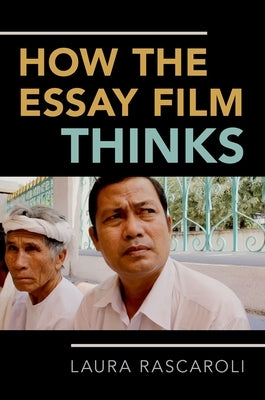1
/
of
1
OUP Us
How the Essay Film Thinks P
How the Essay Film Thinks P
Regular price
€61,95 EUR
Regular price
Sale price
€61,95 EUR
Shipping calculated at checkout.
Quantity
Couldn't load pickup availability
This book offers a novel understanding of the epistemological strategies that are mobilized by the essay film, and of where and how such strategies operate. Against the backdrop of Adorno's discussion of the essay form's anachronistic, anti-systematic and disjunctive mode of resistance, and capitalizing on the centrality of the interstice in Deleuze's understanding of the cinema as image of thought, the book discusses the essay film as future philosophy-as a contrarian, political cinema whose argumentation engages with us in a space beyond the verbal. A diverse range of case studies discloses how the essay film can be a medium of thought on the basis of its dialectic use of audiovisual interstitiality. The book shows how the essay film's disjunctive method comes to be realized at the level of medium, montage, genre, temporality, sound, narration, and framing-all of these emerging as interstitial spaces of intelligence that illustrate how essayistic meaning can be sustained, often
in contexts of political, historical or cultural extremity. The essayistic urge is not to be identified with a fixed generic form, but is rather situated within processes of filmic thinking that thrive in gaps.
Author: Laura Rascaroli
Publisher: OUP Us
Published: 06/02/2017
Pages: 224
Binding Type: Paperback
Weight: 0.83lbs
Size: 9.10h x 6.10w x 0.70d
ISBN: 9780190238254
Review Citation(s):
Choice 12/01/2017
in contexts of political, historical or cultural extremity. The essayistic urge is not to be identified with a fixed generic form, but is rather situated within processes of filmic thinking that thrive in gaps.
Author: Laura Rascaroli
Publisher: OUP Us
Published: 06/02/2017
Pages: 224
Binding Type: Paperback
Weight: 0.83lbs
Size: 9.10h x 6.10w x 0.70d
ISBN: 9780190238254
Review Citation(s):
Choice 12/01/2017
About the Author
Laura Rascaroli is Professor of Film and Screen Media at University College Cork, Ireland. She is the author and editor of several volumes, including The Personal Camera: Subjective Cinema and the Essay Film (2009), Crossing New Europe: Postmodern Travel and the European Road Movie (2006), co-written with Ewa Mazierska, and Antonioni: Centenary Essays (2011), co-edited with John David Rhodes. She is the General Editor of Alphaville: Journal of Film and Screen Media.
Share


